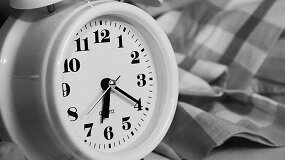Last updated July 12, 2017 at 2:30 pm
Don’t snooze on these new findings. Research shows teenagers have a later sleep pattern compared to older adults.
 Teenagers – this is the excuse you need, and adults – this is the research you wish you had years ago. According to US and German research, teenagers really do need that extra snooze time compared to adults – or at least, that’s what their biological clock is telling them to do.
Teenagers – this is the excuse you need, and adults – this is the research you wish you had years ago. According to US and German research, teenagers really do need that extra snooze time compared to adults – or at least, that’s what their biological clock is telling them to do.
A study published in PLOS One reveals the sleep patterns of over 54,000 Americans. They found that teenagers have later chronotypes but this became earlier as they got older.
You may have heard of the circadian rhythm, your biological clock. It syncs with light and darkness from the environment. Your chronotype is how your individual body manifests its physiological, cognitive and behaviour rhythms with your circadian rhythm. People with early chronotypes have earlier sleep times and those with late chronotypes have sleep much later.
Using the mid-point of sleep on weekends as a determinant for chronotype they found that chronotypes vary a lot – both over an individual’s lifetime as they age and among individuals of a given age. The average chronotype of a 17-18 year old was 4.30am compared to 3am for 60 year olds. They also found that between individuals of any given age, chronotypes can vary up to 10 hours.
Sleep plays an important role in physical and mental health, as well as performance. The researchers suggest this evidence supports the idea of later school start times to align with their biological clock. They also suggest tailored work schedules for adults in order to get the best out of employees. It also has a profound effect on people’s abilities who do night and shift work.
Interestingly, the greatest differences (more than 50%) were observed between 15 and 25 for both men and women, while variability decreases with age. A general difference was also seen between men and women. Men are typically later chronotypes than women before 40, but earlier types after 40.
Hopefully with this news it’s given you some comfort so you can rest easy and get a good night’s sleep (even if your night doesn’t correlate with daylight). If you know a teenager, let them sleep in – unless they’ve got school or work.
- Link to original research article: journals.plos.org/plosone/article?id=10.1371/journal.pone.0178782
Follow us on Facebook, Twitter and Instagram to get all the latest science.
































































































































































































































































